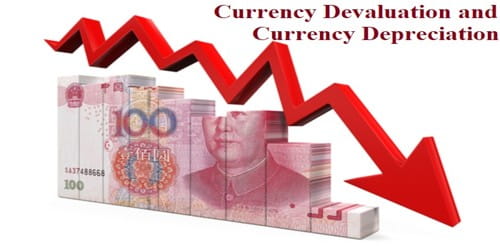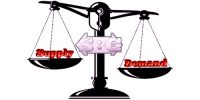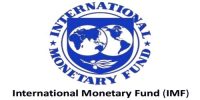Definition of Devaluation: Devaluation is when a country makes a conscious decision to lower its exchange rate in a fixed or semi-fixed exchange rate. Therefore, technically devaluation is only possible if a country is a member of some fixed exchange rate policy. Devaluation occurs when a country makes a conscious decision to lower its exchange rate in a fixed or semi-fixed exchange rate.
Definition of depreciation: When there is a fall in the value of a currency in a floating exchange rate. This is not due to a government’s decision, but due to supply and demand-side factors. Depreciation is when there is a fall in the value of a currency in a floating exchange rate.
Differences between Currency Devaluation and Currency Depreciation –
Currency depreciation: When there is a fall in the value of a currency in a floating exchange rate. This is not due to a government’s decision, but due to supply and demand-side factors.
- The purchasing power of currency is reduced by the government.
- Devaluation occurs casually.
- It occurs due to specific reasons for the domestic economy.
- When a currency depreciates, this means that the currency has decreased in value when compared to another nation’s currency.
- Money depreciates when the money market–the currency exchange market–is willing to only pay less than before for a specific country’s currency.
- Depreciation occurs when a country’s exchange rate goes down in the market. The country’s money has less purchasing power in other countries because of the depreciation.
- Depreciation of the currency happens when the country follows a flexible exchange rate. Flexible interest rate means that the value of the currency is determined by the demand and supply and the central bank doesn’t intervene in it.
Currency devaluation: It happens when a country makes a conscious decision to lower its exchange rate in a fixed or semi-fixed exchange rate.
- Purchasing power is reduced by the international market.
- Depreciation occurs on a regular trance basis.
- It occurs for current demand and supply of currency.
- This occurs when a country lowers the official value of its currency in relation to foreign currencies.
- Money is devalued when a government lowers–devalues–the worth, or value, of its currency.
- The exchange rate can change only when the government decides to change it. If a government decides to make its currency less valuable, the change is called devaluation.
- It happens in countries with a fixed exchange rate. In a fixed exchange rate, the central bank decides what should be the value of its currency compared to other countries. The Central bank intervenes by buying or selling government securities to keep its exchange rates fixed.
So, Currency depreciation means reduce in the level of money due to market forces. It will happen due to financially viable fundamentals, interest rate differentials, political unsteadiness, risk aversion among investors, etc. Currency devaluation is a financial policy instrument (used internally by the country itself): a purposeful descending modification to the value of the currency comparative to another currency or group of currencies. Now, the difference, the key difference is that depreciation occurs with countries with floating exchange rate while devaluation occurs with countries with a fixed exchange rate. Both mean that the currency loses value. Perhaps we can say, depreciation is steadier or market correlated.












